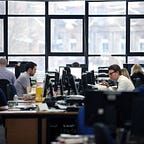How ‘listening to locals’ helped shape the BBC’s General Election coverage
The boss of the BBC’s local services has spoken of the importance of remembering that a General Election is ‘not just a national vote, but 650 individual ballots.’
While political parties sought to set the news agenda daily, local journalists at the BBC were encouraged to make sure they were listening to the views of local people, which in turn went on to inform coverage right across the Corporation.
Last week’s vote was the first covered by the BBC’s regional journalists since it took an axe to hundreds of shows on its local radio network so it could fund a massive expansion of online news coverage.
For the election, BBC Local Radio — which has been criticised for failing to cover big, local news stories when they break during hours when shows are being syndicated across regions or the whole of England since local output was cut — brought back additional local programming throughout Thursday and Friday to keep listeners up to date.
Online, its beefed up local news teams — considered by local publishers to be an overt attempt to compete with existing independent news providers — provided a great depth of coverage throughout the campaign.
Jason Horton, director of production at BBC Local, reported that 16m people a week were now viewing BBC local news coverage online, with traffic — not specified whether readers of page views — up 4m, or 30%, versus the same period last year.
He said: “Across BBC Local we see the General Election, not just as a national vote, but as 650 individual ballots across the country. We are working across every platform to tell these distinctive stories — supported by our 39 local news team across England.
“Together, our local storytelling reaches almost half the adult population every week across Local Radio, BBC Sounds, our 6.30pm regional news programmes, BBC One’s Sunday Politics, BBC News Online, BBC iPlayer and social platforms.
“Our focus for any election coverage is always our audience. That why we have worked with colleagues in BBC News to deliver Your Voice, Your Vote to hear, firsthand issues and concerns from where our audiences live.
“Not only does it give us stories uploaded directly to our teams to cover, it also helps inform and shape the topics we cover in the run up to the election.
“It’s been an invitation to voters to tell us what’s on their mind, whether that’s Julie from Grimsby who had a clear message for politicians on housing and social care for people with disabilities or people discussing immigration in Boston and Skegness.”
During the campaign, the BBC held local debates and hustings in all 39 local radio areas it serves, with each local debate available on BBC iplayer.
Local political reporters were also provided a national platform on the BBC’s flagship bulletins.
Jason added: “We’re also continuing to work closely with our colleagues across Network News to make sure local issues are being heard nationally with our Local Political Reporters appearing on the BBC 6 O’clock News. Every day, two reporters from across the country have been on the programme bringing their expert local knowledge and insight to a national audience.
“On social media we are fully focused on making sure we are hearing from our audience to bring them the trusted information they need. Whether that is ping-pong ball politics in Greater Manchester or vox-popping voters in South East London on local issues.”
The BBC insists its expansion into like-for-like coverage online is not an attempt to compete with existing publishers, instead pointing out that other things — such as tech platforms — are to blame for the challenges facing local news organisations.
It argues it is trying to support local news publishers through its ongoing investment in the Local News Partnership, which sees the BBC fund the Local Democracy Reporters Scheme. 165 journalists are based in local newsrooms around the country, with the content they produce being used by all partners in the scheme, including the BBC.
Publishers say the BBC has a built in competitive advantage when it chases the same stories as existing publishers, thanks to the fact it doesn’t need to carry adverts to secure funding, and also has huge resources at its disposal to create the fastest possible websites.
By diverting audience from local publishers to the BBC for popular stories, such as breaking news, the Corporation is undermining the ability of existing publishers to underwrite the production of community and less-scalable local news, say publishers.
Ofcom is currently investigating the impact the BBC is having on the local news sector as part of the mid-term charter review which determines the future role of the BBC and its licence fee.
